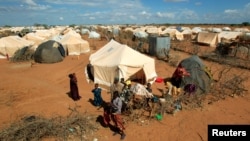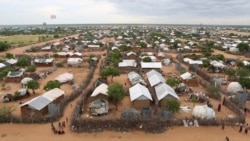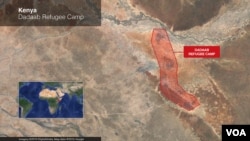The largest refugee camp in the world will remain open, according to Kenyan high court justice John Mativo who ruled Thursday the government’s orders to close the camp were discriminatory and “indignifying.”
“That the government decision, specifically targeting Somali refugees, is an act of group persecution, illegal, discriminatory, and therefore, unconstitutional,” said Mativo, who also announced that the disbanded Department of Refugee Affairs should be reinstated.
In May 2016, the government announced it would be closing Dadaab, a massive refugee camp sheltering about 258,000 Somali refugees, by November. That order was then delayed for an additional six months.
Twenty-four year old Mohamed Abdullahi Jimale is one of those who would have been affected by the camp’s closure.
“Really, that is the best ever news I have ever heard of,” Jimale said. “Because someone like me, who was born and raised in the camps, who has never seen Somalia and does not know anything about Somalia, and we really appreciate the rulings of the court.”
Watch related video report from VOA's Zlatica Hoke:
But not everyone is happy with the verdict. Kenya Ministry of the Interior spokesperson Mwenda Njoka says the government plans to appeal the ruling because its original motivation for closing the camp remains.
“The main reason was security, the fact that the camps have lost their humanitarian character and they became places where terrorists would come, al-Shabab and their sympathizers would go and plan their attacks on Kenya. So that has not changed,” said Njoka. “And the fact also that the Republic of Somalia has also stabilized its country. They just elected a new president yesterday.”
‘Disproportionate burden’ acknowledged
Deputy regional director for Amnesty International, Michelle Kagari, is pleased with the ruling, but acknowledges that Kenya has "borne a disproportionate burden" when it comes to hosting refugees.
“And this is an opportunity, really, for Kenya to demonstrate leadership, to ensure durable solutions, to the refugee population, including pushing for rich governments, Western governments, to step up to the plate and take up their responsibilities and share the burden with regards to hosting refugees,” said Kagari.
According to UNHCR Kenya spokesperson Yvonne Ndege, Kenya has always been a hospitable country where people could seek protection and assistance.
“And so this perhaps is a sign or a reinforcement of the kind of culture, an attitude, that Kenyans have towards their neighboring countries, and the people of those countries, who for one reason or another, have had to flee here,” said Ndege.
But regardless of the results of the appeal, Njoka says the Kenyan government will comply.
“We operate within the confines of the law,” said Njoka. “So if we were to lose, we would definitely have to work with that. We cannot defy a court order.”
In addition to Amnesty International, Human Rights Watch, the Norwegian Refugee Council and Doctors Without Borders also released statements expressing their approval of the court’s decision.
Since mid-May 2016, when the Kenyan government announced its closure decision, almost 34,000 refugees have gone to Somalia through the U.N. refugee agency’s return assistance program.







